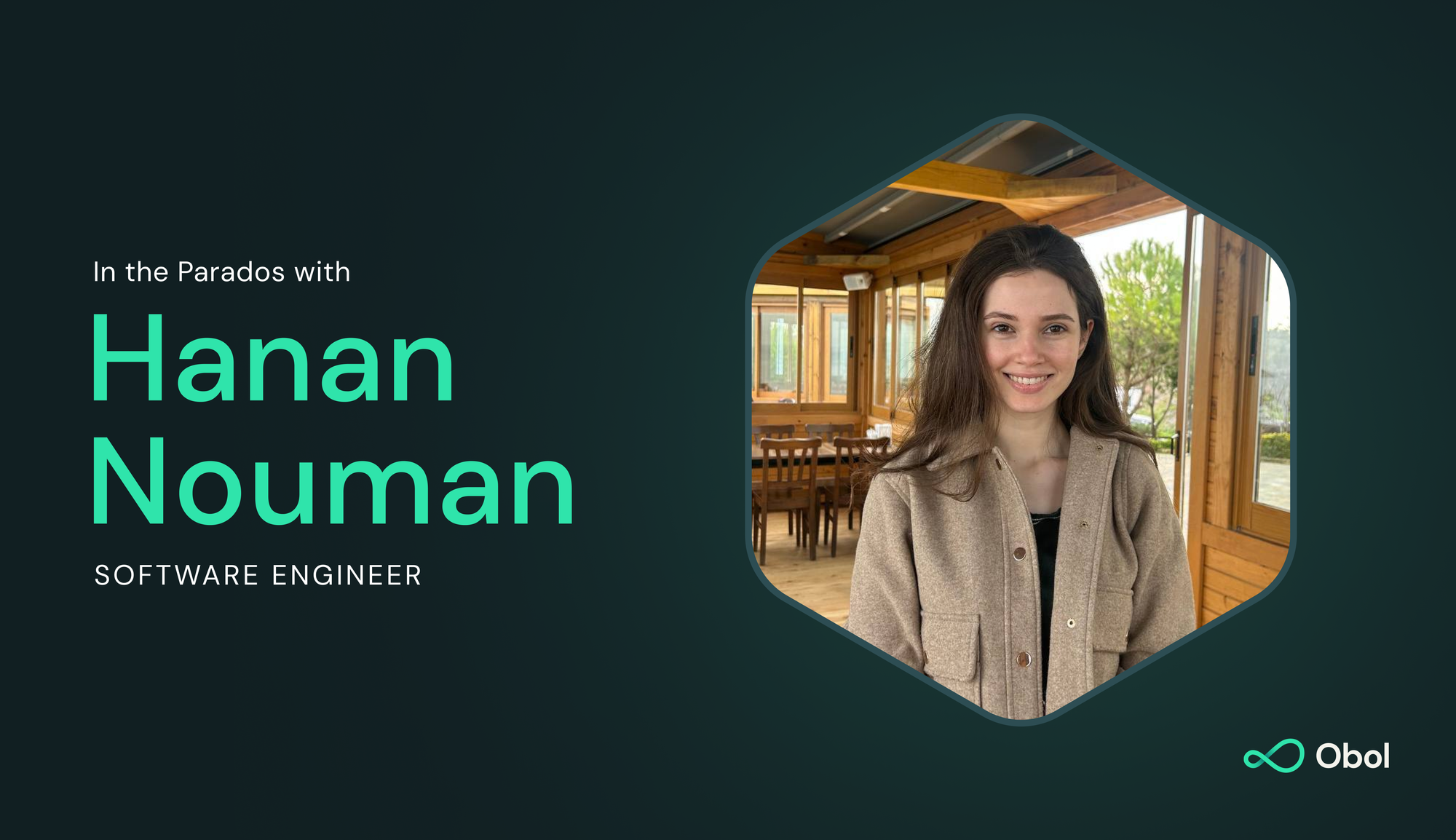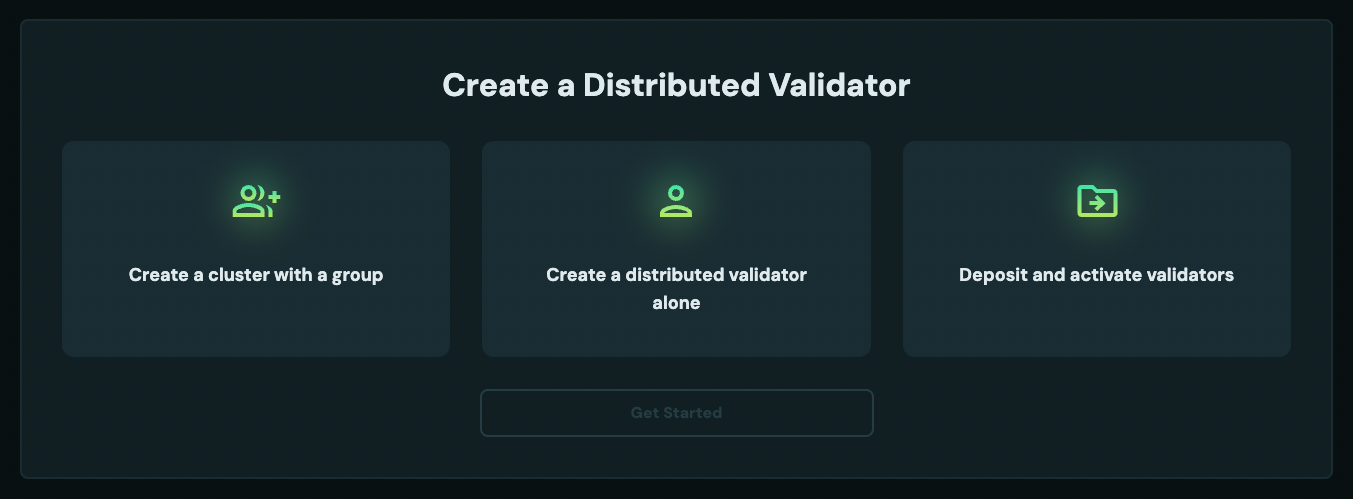In The Parodos: A Conversation With Hanan Nouman
We continue our interview series with full stack developer Hanan, who entered the crypto industry as a software engineer at Consensys in Dubai. Hanan sees DVT as leveling the playing field for small holders of Ethereum, and is motivated to build immutable crypto tech.

Today, you work as a full stack developer, but in university you studied Electrical Engineering. Why did you choose electrical engineering?
In Jordan, after high school you usually study medicine or engineering, if your grades are good enough. I was a top student throughout high school, and I was obsessed about math and physics, especially classical physics (Newtonian mechanics, electromagnetic theory), so I chose engineering.
In 2018, you enrolled in a software engineering boot camp. Why did you make the switch from electrical engineering to software?
I always thought that I would either do an electrical engineering masters or PhD, but in Jordan if you aren't in the sustainable energy field, it’s a bit dead - there’s not much R&D happening. I felt like I wouldn't grow if I stayed in the same field. So I thought, I can try programming.
What was the coding boot camp like? What did they teach?
It was mainly focused on teaching web development to refugees from places like Syria and Palestine, but it also had Jordianians attending, and it had a scholarship for women, so I thought why not?
We learned Angular, React, but also some backend like Express.js and JavaScript. We learned how to use relational and non-relational databases. But we were also learning algorithms to solve problems that we were given every day. At the end, you had the basic knowledge to bootstrap as a web developer.
What is web development?
It has to do with building web applications where the user is interacting with a server: sending, reading, or updating data in a readable and secure way. So it's not just the user interface, but rather involves the full stack.
And was this bootcamp also your first touchpoint with crypto?
Yes, during a group project we used Hyperledger Fabric to create a charity application. I also picked up some basic Solidity knowledge, and later even worked as a facilitator in an Ethereum bootcamp, creating learning materials for the students and giving sessions with my team.
What did you initially think about crypto? Were you motivated to pursue it?
At first, we just thought it's a new technology and we might end up in great jobs if we pursue it. Then, as I read more about it, I started to see that it’s really different.
I became obsessed with this idea of changing the financial model and letting people who aren't rich have a chance. Letting people control what they own, without going through entities to do what they need to do. People can run it, on their machines, anyone can be part of it. The immutability part is important - no one can tamper with them. It even challenges governments, especially in this part of the world.
And then you worked for ConsenSys in Dubai as a Junior Software Engineer - did you apply right after the coding bootcamp?
Yes, I did. A Jordanian from ConsenSys gave a talk in Jordan, which made me feel like “I can work there, it’s not an unrealistic dream.” Also, my best friend Bushra encouraged me and helped me apply. It was the biggest crypto company at the time - in Dubai we were 25 or 30 people. Eventually, though, I lost interest and moved to Bucharest, Romania and worked as a frontend engineer in Web2.
So how did it come about that you re-entered Web3, joining Obol in 2022?
A recruiter reached out, and when I heard about Obol and DVT, I felt very hyped. It was clear that DVT would help prevent power from concentrating in some entities’ or peoples’ control. I didn’t know about the other benefits back then, like protecting from slashing and the active-active redundancy setup, but the decentralization part was enough for me to be very excited again.
At the time, I was really disappointed with Proof of Stake: Ethereum had been talking about transitioning to Proof of Stake since 2018, but it wasn't convenient. I thought that it would only make the rich richer. That was the first thing that came to my mind - my problem was with the money.
How do you explain your work to friends and family?
It allows people who are not the most experienced or the most rich to be part of the network that we’re building.
And more specifically, what are you working on?
I work on the DVT launchpad and the SDK on the full stack. The launchpad is where node operators can configure their clusters’ addresses, ENR identities, and withdrawal config, before signing the terms, and activating their validators. Meanwhile, the SDK allows developers to easily communicate with our back end to create, and fetch clusters.

It must be great to work with Chris Battenfield, who made the original Ethereum launchpad!
Yes it’s amazing to work with him, I feel confident since he worked on it before.
So what is a typical day in the life of a full-stack developer at Obol? What does your workflow look like?
I always try to see what tasks I need to prioritize the day before, and sometimes from the sprint planning I have an idea of the order of the tasks. Basically my workflow is: build, test, ask colleagues/CTO, review PR’s, repeat.
What are some of the challenges of working on a blockchain product?
It’s similar to Web2 development, but you need to be good in dealing with wallets and integrating with smart contracts. You have to gain other kinds of knowledge, like how to deal with web3 packages, libraries, and signature verifications… If I have questions, I usually ask colleagues or our CTO. There are also a lot of articles and other resources out there, and I should not forget about ChatGPT!
What would you say to someone considering becoming a software engineer?
If you like challenges and want your mind to always grow, then go for it! As a software engineer you’ll never say “I don't have work to do.” There will always be features to build, code to improve, bugs to fix, etc. It’s really fun! There are lots of resources to learn: articles, books, courses, and there's always a community to help out, so you won't feel stuck.
Final Thoughts: Is there anything else you would like to share with our community, perhaps a personal mantra or a lesson learned that guides your professional journey?
Building DVT makes me feel more free - it’s returning power into the hands of communities. I saw a question on Twitter: what emoji would you use for DVT, and I think I would choose a feather 🪶, because it represents freedom.
